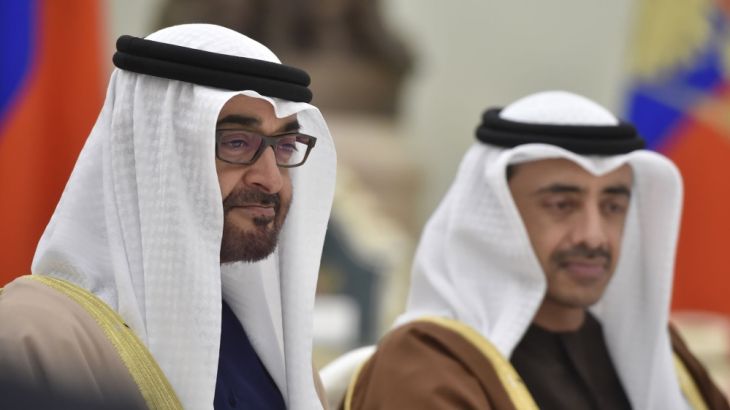Abu Dhabi’s problem with the Muslim Brotherhood
How the United Arab Emirates’ broad definition of ‘extremism’ has impacted regional politics since 2011.

In March 2011, buoyed by the revolutions sweeping the region, a group of 132 Emirati intellectuals and activists petitioned President Khalifa bin Zayed Al Nahyan to institute reforms. They were calling for the United Arab Emirates‘ National Council be democratically elected and granted full legislative powers.
Days later, the government they petitioned deployed hundreds of police officers to Bahrain, where they joined a contingent of Saudi troops to end an uprising on the island kingdom. It was the first of several Saudi-Emirati measures to rein in the “advances” of the Arab Spring and eliminate critical voices that questioned their rule.
Keep reading
list of 4 itemsWhat challenges do Turkey, Egypt face in restoring ties?
Yusuf al-Qaradawi, the Muslim scholar who influenced millions
Qatar’s emir in Cairo for talks with Egypt’s president
By most accounts, the Emiratis who signed the petition represented a cross-section of society – doctors, lawyers, judges, and academics – and included members of Al Islah (Reform), a social movement ideologically linked to the Muslim Brotherhood (the Brotherhood).
The crackdown was severe, especially on Al Islah.
Arrests began in April and soon expanded to include most Emiratis who signed the petition; they were accused of promoting “terrorist” ideology and plotting to overthrow the government.
By the end of 2011, six Emiratis had had their citizenship revoked and dozens more were handed hefty prison sentences.
According to US diplomatic cables released by WikiLeaks in 2010 and 2011, UAE Crown Prince Mohammed bin Zayed (also known as MBZ) had a long-held antipathy towards the Brotherhood, and often spoke with US officials about his efforts to target alleged members within Emirati society.
Despite the fact that Al Islah denied having links to the Brotherhood, they were viewed with suspicion by MBZ and his brothers, who rarely missed an opportunity to talk about their supposed “influence”.
“The Emirati government’s crackdown on Islah, in my view, was not based on actual level of threat or even of popularity of that movement, but rather on the government’s (and especially Sheikh Mohammed bin Zayed’s) calculation that political Islam of any type is fundamentally threatening to government stability and security,” Courtney Freer, author of Rentier Islamism: The Influence of the Muslim Brotherhood in Gulf Monarchies, told Al Jazeera.
“As a result, today, Islamist movements have largely moved underground, with the government eager to promote so-called ‘moderate Islam’ in its place,” she added.
The crackdown had a chilling effect on civil society in the UAE and was a prelude to more dramatic measures to challenge Brotherhood-linked political movements, including support for a counterrevolution in the Arab world’s most populous country, Egypt.
The blockade of Qatar, which is about to enter its second year, appears to be motivated in part by Abu Dhabi’s long-held antipathy towards individuals, institutions, and governments that appear supportive of “political Islam”, which the UAE government has framed as “extremism”.
Revolution 2.0
In the elections that followed the Arab Spring, a number of Brotherhood-linked parties succeeded (to varying degrees) at the ballot box, including Ennahdha in Tunisia, the Freedom and Justice Party in Egypt, the Justice & Development Party in Morocco, Islamic Action Front in Jordan, and the Islamic Constitutional Movement in Kuwait.
When a military coup was staged in 2013 to overthrow Egypt’s first democratically elected president, Mohamed Morsi, the UAE and Saudi Arabia supported it, opting for their version of strong-man “stability” over rapid democratic change.
As far back as 2011, the UAE and Qatar have followed policies “that are in some cases near-diametric opposites, particularly as they related to the unfolding political transitions in North Africa,” Kristian Ulrichsen, research fellow at Rice University’s Baker Institute for Public Policy and author of The United Arab Emirates: Power, Politics, and Policy-Making, told Al Jazeera.
“It seems that the visceral reaction to Qatari Arab Spring policies in Abu Dhabi has been the trigger for both the 2014 iteration of the spat and the 2017 version, and that MBZ has worked closely with MBS (Saudi Crown Prince Mohammed bin Salman) in Riyadh to try and present a united front not only on the Qatar issue but also on Yemen, as well,” he added.
Politicisation of ‘terrorism’
There were signs of a rupture emerging between Abu Dhabi and Doha, years before the Arab Spring.
Diplomatic cables sent from the US Embassy in Abu Dhabi between 2004 and 2010 recount dozens of meetings between MBZ and US officials, where they discussed politically sensitive topics he never discussed in public.
US officials noted how MBZ generically uses the term “Muslim Brotherhood” for all “extremists“, ranging from armed groups like al-Qaeda, to populist movements that participate in democratic elections across the region.
By 2014 though, his broad definition of “extremists” was more widely accepted, after Saudi Arabia designated the Brotherhood a terrorist organisation.
The UAE followed suit and passed legislation that opened the way to “terrorism” prosecution to those expressing peaceful opposition to the government.
Human Rights Watch condemned the government for passing such a “violent and extreme law” at the time, while claiming to be a “key ally in the fight against violent extremism”.
More shockwaves were felt that year when the UAE released its terror list, lumping the Islamic State of Iraq and the Levant (ISIL, also known as ISIS) group and al-Qaeda with nonviolent organisations based in the US and Europe.
At the time, Foreign Minister Abdullah bin Zayed told US media that Abu Dhabi’s “threshold for extremists was quite low”, earning him praise from right-wing pundits for going above-and-beyond the US list of Foreign Terrorist Organizations.
Since the beginning of the Gulf crisis one year ago, additions to the list have also been rejected by the UN, and even Donald Trump’s State Department.